Photographs: Vivek Prakash/Reuters. Viveat Susan Pinto, Neha Pandey Deoras and Tania Kishore Jaleel
Bhashar Seetharam and Varsha Das are a double-income-no-kids couple residing in Mumbai. The 29-year-old Seetharam is a consultant with a company, while 26-year-old Das is a public relations executive.
Together, they bring home Rs 18 lakh in household income per year, which is Rs 1.5 lakh a month.
Seetharam and Das belong to a hallowed club: they are part of India's one per cent - households having an annual income of over Rs 12.5 lakh, shows an analysis by the Centre for Macro Consumer Research (CMCR) of the National Council of Applied Economic Research (NCAER) for 2010-11.
The research houses call them the affluent or the rich.
...
Good news! India's 'rich' households rising
Image: Women stand next to a shop selling garlands made of Indian currency notes in Jammu.Photographs: Mukesh Gupta/Reuters.
The cut-off to enter India's one per cent - Rs 12.5 lakh - is nothing to write home about compared to global standards.
The cut-off point for the top one per cent in the US varies from about $500,000 to $700,000.
If one takes the lower figure ($500,000, equal to Rs 2.6 crore), it is over 20 times the Indian figure. Adjusted for purchasing power parity, it would be around 10 times.
| BHASKAR SEETHARAM & VARSHA DAS | |
| Rs 18 lakh | Total annual income |
| 40% | Savings (use instruments such as |
| 30% | Spending on |
| 30% | Discretionary |
...
Good news! India's 'rich' households rising
Image: Distribution of Income.The good news is that India's one per cent club is growing rapidly. Sample this.
In 1993-94, the top quintile or top 20 per cent of households in India accounted for 37 per cent of total income.
This grew to 53 per cent of total income in 2009-10, and is expected to touch 59 per cent by 2014-15 (see chart: Distribution of Income: Quintile Analysis).
...
Good news! India's 'rich' households rising
Image: Households in the top quintile were high spenders.This top quintile also has a higher share in the total household income pie for India.
It stands at 51 per cent to the bottom-of-the-pyramid's six per cent and middle-income's 14 per cent, respectively (see chart: Many Indias) in 2009-10.
Households in the top quintile were high spenders, too, at 40 per cent of total private consumption.
...
Good news! India's 'rich' households rising
Image: People shop in the chilled foods section of a Reliance Fresh supermarket in Mumbai.Photographs: Danish Siddiqui/Reuters.
In contrast, the bottom-of-the-pyramid accounted for just nine per cent and middle-income 17 per cent of total private consumption.
Thanks to their higher earning ability, the income surplus of households in the top quintile was 76 per cent in comparison to seven per cent for mid-income households and a deficit of two per cent for the bottom-of-the-pyramid.
So, what do households with a high income surplus do? And, how do they spend the money they earn?
...
Good news! India's 'rich' households rising
Image: A Indian tourist couple playfully tosses snow at each other during the winter season's first snowfall in Srinagar.Photographs: Danish Ismail/Reuters.
Approximately 30 per cent of their monthly income, says Seetharam, goes towards routine expenditure - rent to the landlord, utility bills, food, etc.
Forty per cent is saved by the couple, but they would like to take that number to 50 per cent so that they can buy a house in Mumbai.
The balance 20 per cent goes towards discretionary expenditure, such as travel. "We love travelling. That's a great way to unwind," says Seetharam.
...
Good news! India's 'rich' households rising
Image: People dressed in Santa Claus costumes dance before they cut a 101-feet (31-metres) long cake as part of Christmas celebrations.Photographs: Ajay Verma/Reuters.
Seetharam and Das provide clues, but here are some more: 50-year-old Lakshmanan is the secretary of the National Stock Exchange Members' Association in Mumbai.
His wife is a homemaker and their only son is studying in Pittsburgh, the US. Their annual income is around Rs 15 lakh or Rs 1.25 lakh a month.
The prudent man that Lakshmanan is, he and his middle-aged wife end up saving almost 60 per cent of their income, or Rs 75,000 a month.
...
Good news! India's 'rich' households rising
Image: A girl looks at books at a stall selling books.Photographs: Pawan Kumar/Reuters.
The balance 40 per cent or Rs 50,000 goes towards the monthly expenditure - food, travel, maintenance of their house, which they own in Vashi, Navi Mumbai, upkeep of their car, servant's salary, etc.
The only liability that Lakshmanan has is a Rs 7 lakh education loan that he has taken on behalf of his son.
"Otherwise, we are quite comfortably placed in terms of savings and spending," he says.
...
Good news! India's 'rich' households rising
Image: Distribution of Routine Expenditure.The NCAER-CMCR study corroborates what affluent individuals such as Lakshmanan are saying.
Unlike other income groups, the rich actually end up spending only 40 per cent of their total expenditure on food, which is the least when compared to other income groups, such as the middle class's 42.5 per cent, the aspirers' 47.5 per cent and the deprived's 57.3 per cent (see chart: Distribution of Routine Expenditure).
...
Good news! India's 'rich' households rising
Image: Soccer fans shop for t-shirts and jerseys featuring Argentinan and Venezuelan soccer players at a sports goods market in Kolkata.Photographs: Rupak De Chowdhuri/Reuters.
However, the amount in absolute terms would be higher, assuming that the rich would also be spending in proportion to their income.
On housing, the rich are not the highest scorers again: 4.7 per cent as compared to the middle class and aspirers' 5.2 per cent each and the deprived's 4.2 per cent.
The rich, middle class and aspirers clearly realise the importance of education and its co-relation with income.
...
Good news! India's 'rich' households rising
Image: A worker stitches Gandhi caps with the wordsPhotographs: Parivartan Sharma/Reuters.
Not surprisingly, as much as 8.8 per cent of the expenditure of the affluent is on education alone, while the same is 9.2 per cent in case of the middle class.
Notably, it is as high as 8.1 per cent in the case of aspirers, which only indicates the importance they accord to a sound educational background.
...
Good news! India's 'rich' households rising
Image: arrange themselves into a formation of the Pongal Panai, or an earthen pot, as part of the Pongal festival celebrations in Chennai.Photographs: Babu/Reuters.
In contrast, the spending on education is just 5.7 per cent in case of the deprived.
The study says education attainment levels correspond directly with growth in income.
...
Good news! India's 'rich' households rising
Image: Schoolchildren attend a yoga session during a camp in Ahmedabad.Photographs: Amit Dave/Reuters.
The higher the level of education, the higher is the impact on income.
For example, on households, where the chief earner has only primary-level education, the impact is 22 per cent.
...
Good news! India's 'rich' households rising
Image: Education and Consumerism.But, it is 264 per cent if the chief earner is a graduate and above (see chart: Education and Consumerism).
On clothing, durable goods and health, the rich are marginally higher in terms of percentage of expenditure than other income groups.
...
Good news! India's 'rich' households rising
Image: A participant uses a Bolex P4 camera while sitting inside her 1970 Volkswagen 1,285cc classic car in Kolkata.Photographs: Rupak De Chowdhuri/Reuters.
On transportation, the affluent are marginally higher than the middle class and aspirers at 14.7 per cent to the latter's 13.5 per cent and 11.6 per cent, respectively.
There is also 13.8 per cent miscellaneous expenditure by rich households in comparison to 12.5 per cent of the middle class and 10.9 per cent of aspirers.
...
Good news! India's 'rich' households rising
Image: A man uses an iPad to shoot video of supporters of veteran Indian social activist Anna Hazare during an anti-government rally in Mumbai.Photographs: Danish Siddiqui/Reuters.
Whilst NCAER does not spell out what this miscellaneous expenditure is, independent analysts estimate it could include expenditure on entertainment and leisure.
According to a 2011 study of the affluent by French market research major IPSOS, affluent Indians have a higher penetration of gadgets and gizmos: 61 per cent own a mobile phone and 18 per cent own a smartphone, 36.7 per cent own a desktop computer, while laptop & notebook ownership was found to be significant at 35 per cent.
...
Good news! India's 'rich' households rising
Image: A school girl uses a laptop provided under thePhotographs: Danish Siddiqui/Reuters.
Handheld devices, palmtops and personal digital assistant (PDA) penetration is low at 5.7 per cent.
This study called the IPSOS PAX (Pan Asia Cross) Survey was done after speaking to 3,108 affluent Indians.
...
Good news! India's 'rich' households rising
Image: A Rajasthani artisan plays music at the entrance of the Meharangarh Fort in the historic town of Jodhpur.Photographs: Vijay Mathur/Reuters.
The study covers close to 15 million of the elite, business executives and top management across 11 markets in the Asian region.
IPSOS India's managing director Mick Gordon says, "Music-loving, affluent, urban Indians have a significantly higher penetration of MP3 players (26.8 per cent) and MP4 players (14.8 per cent)," Mick Gordon said.
...
Good news! India's 'rich' households rising
Image: Tourist walk along the Sky Walk over looking the Grand Canyon on the Hualapai Indian Reservation near Peach Springs, Arizona.Photographs: Joshua Lott/Reuters.
"55.2 per cent of affluent Indians also have access to the Internet, while these individuals take at least one leisure trip and one overseas business trip a year," Mick Gordon said.
This point is corroborated by 29-year-old Manka Mishra, a communications professional based in Delhi.
...
Good news! India's 'rich' households rising
Image: Tourists enjoy their ropeway ride amid a mist of monsoon clouds at the Saputara hill station near Ahmedabad.Photographs: Amit Dave/Reuters.
She lives with her husband, aged 33, who is a vice-president with a well-known company, his parents, both of whom are senior citizens, and an unmarried brother-in-law, aged 30.
Their total household income, given that at least three people are working, is Rs 30 lakh.
Mishra says that half of this income (or Rs 15 lakh) goes towards travelling, entertainment, leisure trips and shopping.

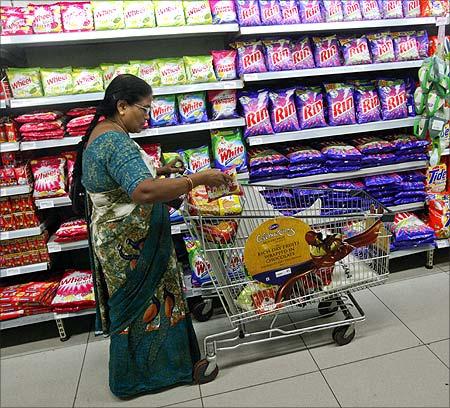
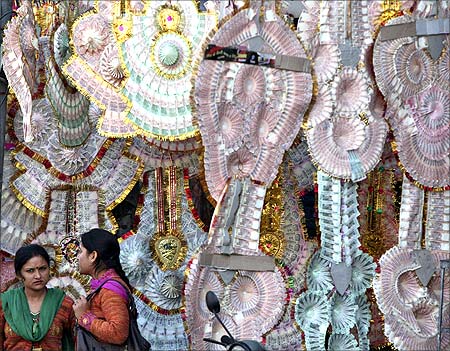
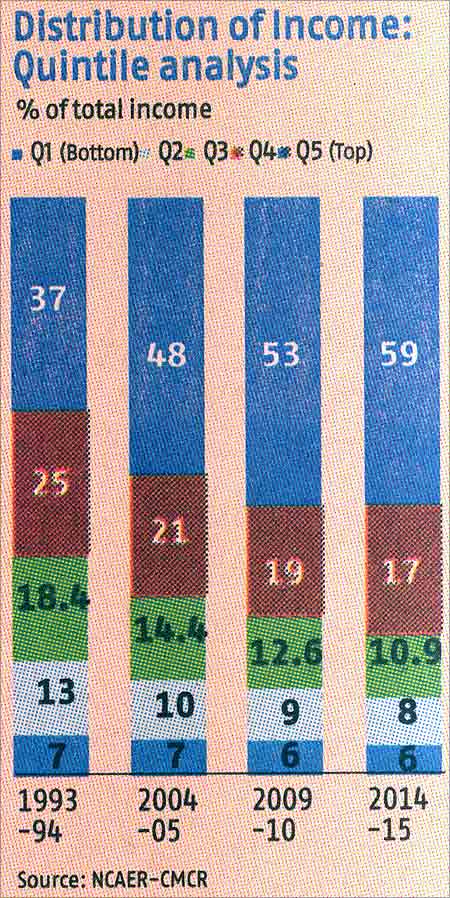
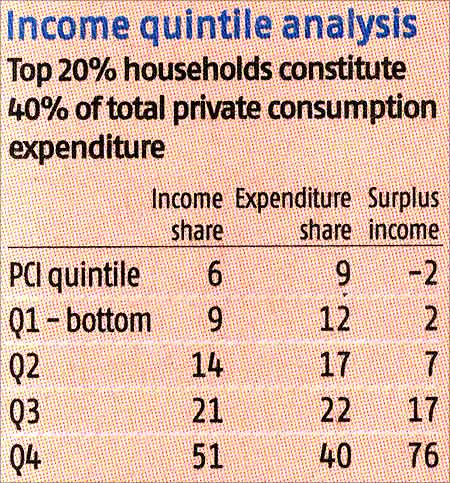
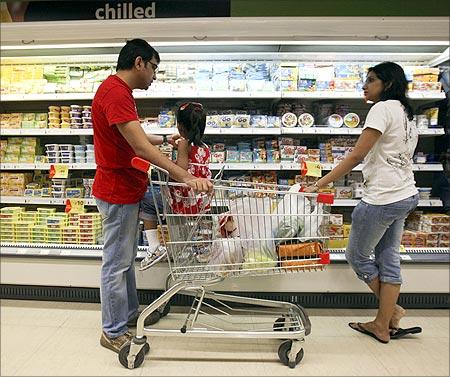


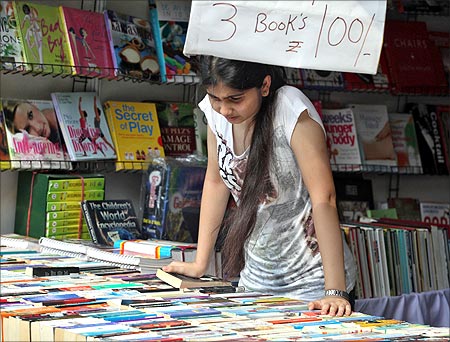
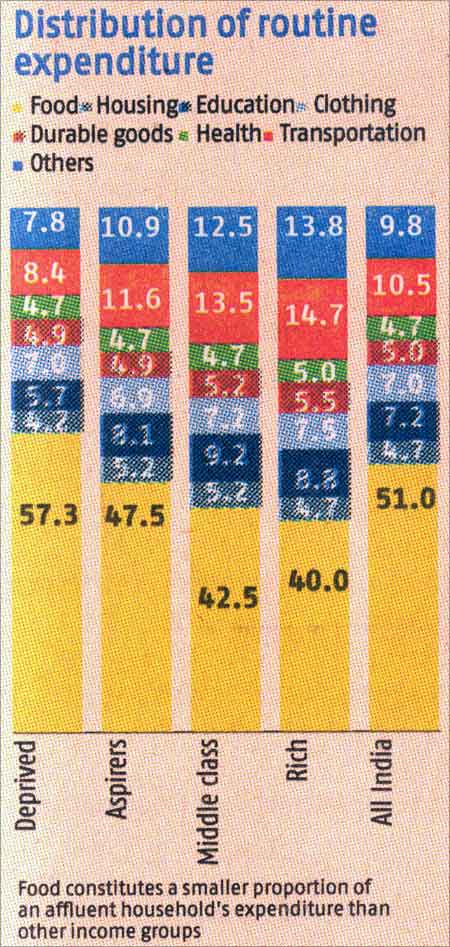

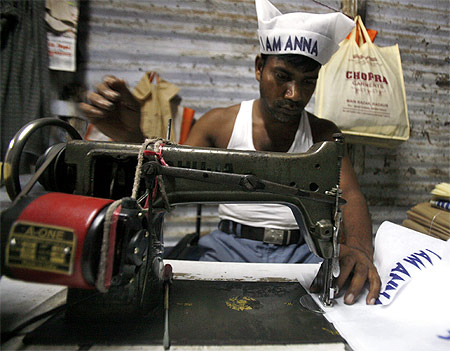

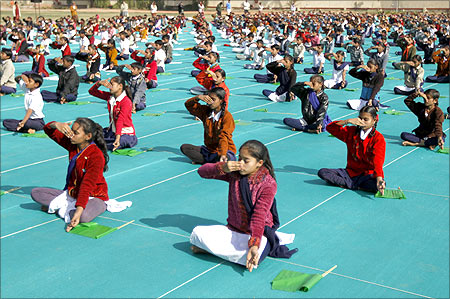
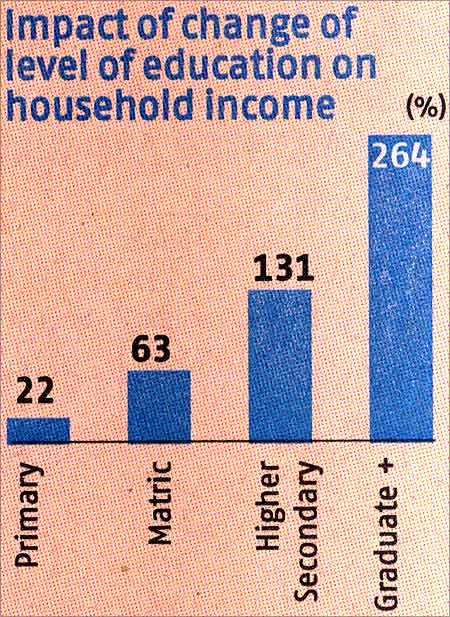
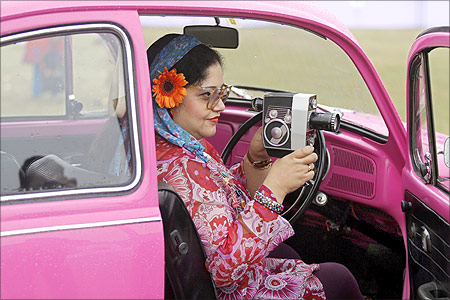
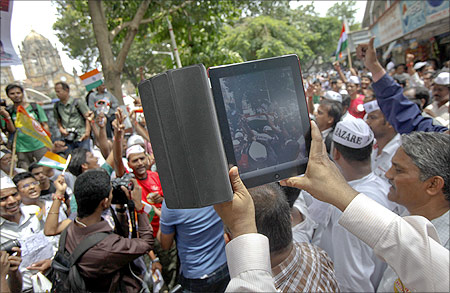
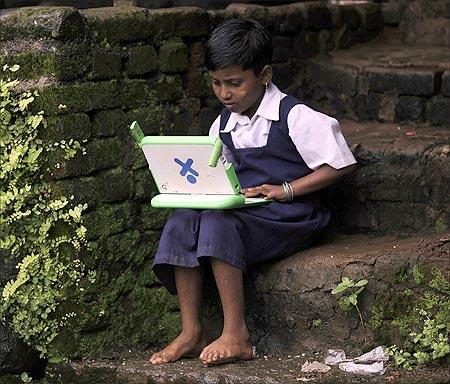
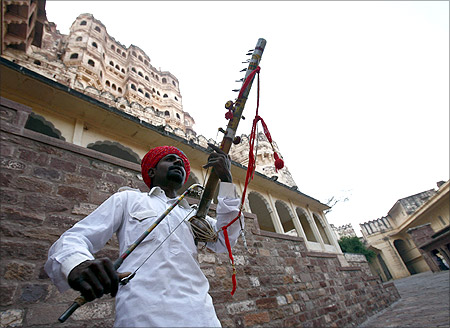
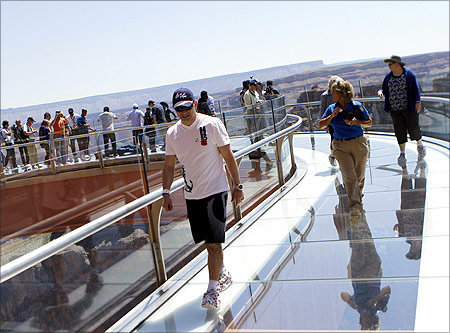


article